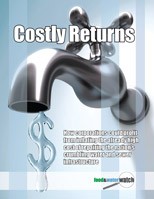News
Water, Incorporated
Jul 06, 2008
 Formula for making a lot of money: Get elected to a position of public responsibility, and collude with your fellow elected officials to neglect your responsibility until the disasters begin to mount, meanwhile investing in the private companies which will ultimately clean up your mess to their own—and your—very tidy profit.
Formula for making a lot of money: Get elected to a position of public responsibility, and collude with your fellow elected officials to neglect your responsibility until the disasters begin to mount, meanwhile investing in the private companies which will ultimately clean up your mess to their own—and your—very tidy profit.
Some services belong in the public sector, and none more so than the provision of clean water and wastewater disposal. That provision is threatened, however, as our aging and neglected national infrastructure deteriorates and industry pushes in to take over the costly task of restoring it. It is estimated we will have to spend up to $1 trillion between 2002 and 2019 to upgrade and repair 1.5 million miles of piping and treatment plants.1
In a report by the Food & Water Watch, a nonprofit consumer organization that works to ensure clean water and food, entitled “Costly Returns,” the group warns that “corporate advocates are deceitfully using the costliness of those [infrastructure] upgrades as ammunition to push elected officials into privatizing their water and sewer systems.” Many of those elected officials don't need much pushing, since they believe everything from Social Security to our armed forces should be privatized, the better to enrich themselves and their cronies.
The report shows in stark terms how undercutting the public good in the management of water services enhances corporate profits at the expense of the environment and the consumer. When the profit motive is substituted for the public good—whether in schools, prisons, libraries, or the delivery of essential public services—you can bet the public good is going to suffer. Profit and public services are incompatible and when they are brought together, the services will suffer for the benefit of the profits. We have seen it happen time and again; the present report documents several instances where large municipalities have rued the day they turned their water management over to the private sector, and have cancelled their contracts.
Our water is one of our collective responsibilities, and the public sector exists to fulfill those responsibilities, notwithstanding the cupidity of many of our current elected officials.
And if you can't drink to that, look for many a dry season ahead.
____________________
1 “Future Investment in Drinking Water and Wastewater Infrastructure.” Congressional Budget Office, Washington, D.C., November 2002, p.8.
Copyright © 2008 All Together Now.